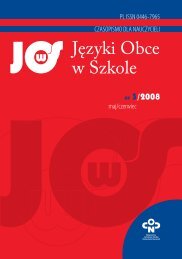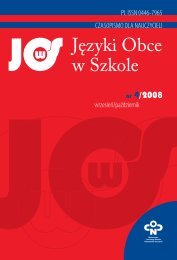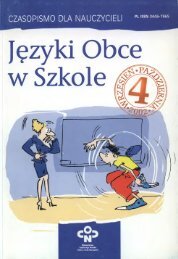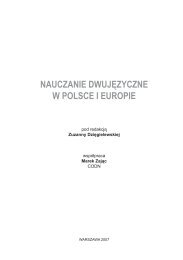PrzeglÄ daj publikacjÄ - Biblioteka Cyfrowa OÅrodka Rozwoju Edukacji
PrzeglÄ daj publikacjÄ - Biblioteka Cyfrowa OÅrodka Rozwoju Edukacji
PrzeglÄ daj publikacjÄ - Biblioteka Cyfrowa OÅrodka Rozwoju Edukacji
- No tags were found...
You also want an ePaper? Increase the reach of your titles
YUMPU automatically turns print PDFs into web optimized ePapers that Google loves.
Domingo tackles Otello from the pitThe most exciting news at the WashingtonOpera doesn’t concern the three productionscurrently in repertoire. Instead, the buzz isover next season: the company’s artistic director,super-tenor Placido Domingo, will sing thetitle role in Wagner’s Parsifal.London, New York and Bayreuth havealready heard Domingo’s Parsifal. Sharing internationalthrills is one of the main reasonsDomingo was brought to Washington four seasonsago, and the company gets its reward:when he is around, its energy-per-production isat a maximum; and Domingo gets his choice ofcolleagues to sing with – or conduct.Which brings us back to the present.Domingo was in the pit for Verdi’s Otello,a revival of the company’s sturdy, sensible1992 production. Jose Cura (a Domingo protege)sang the murdering Moor, physically robustand masculine in voice, a tenor with a velvetybaritone underlying his sound and, also incommon with Domingo, a Spanish-soundingtimbre. But unlike Domingo, the great Otello ofour time, Cura doesn’t bring much nuance tothe role. It’s plain to see and hear that he’sinternally tormented, though not fuelled bypent-up power. The result is a complicated, ifvaguely timid, jealous husband. On the openingnight he pulled back from the heartiestdeclamations, perhaps recovering from a cold.Veronica Viliarroel sang Desdemona ina mix of floating, well-placed tones and glaring,wobbly phrases. She has been a regular inWashington in recent seasons, and her voice isroomy and ample enough to sing Verdi in thebiggest houses.Justino Diaz made a mess of Iago, barkingand croaking his notes while searching forconsistent pitch. Smaller roles were unevenlycast. Corey Evan Rotz played Cassio as a weedy,thin-voiced kid, short on vocal poise, whereasDaniel Sumegi, as the ambassador fromVenice, drew strength from his throaty, muddydistinctive bass.Domingo, a supreme musician, is likemany who have picked up a baton after a fullcareer elsewhere: he doesn’t always convey hisintuitive musical intentions to the players. Althoughhe generally supported the singers andkept the orchestra quiet enough for them to beheard, he overplayed the sweep of the music,highlighting the big gestures in place of theevanescent details that make this an unusuallyrich score.Handel’s Giulio Cesare was led by anotherlate-to-the-profession conductor, Will Crutchfield.Crutchfield is a bel canto scholar, vocal ornamentationexpert, Handelian and former New YorkTimes critic, and he takes up the slack by workinghard and intelligently. For all his acquired insight,he lacks a supple feel for tempos, and supportedsingers awkwardly. That he paces the music againstthe contours of the melodic line is surelyapartoftheproblem,anditmadethethreeand-a-halfhour evening advance sluggishly.Vivica Genaux, as the title character,despite her clear top and husky lower end,made a surprisingly timid emperor, singing withoutmuch force or persuasion. Hei-KyungHong’s Cleopatra, the opera’s dominant character,was bright, lovely and affecting.The Washington Opera originally scheduleda co-production of Cesare with Basel, butit was judged too post-modern for Washingtonaudiences – ’’a sort of Eurotrash deconstruction’’,as artistic administrator Edward Purringtondescribed it. Thus the company rented JohnPascoe’s handsome but stiff staging. updatedfrom his 1988 Met production, and it made anunobtrusive backdrop.For the opera’s centennial, however,Frank Cosaro’s new production of Puccini’s Toscawas the quintessential Washington Operaproduction: vaguely familiar, pretty, with as fewextremes as possible. Alexander Beliaev’s setswere generically realistic, entirely serviceable,intermediate in scale. Galina Gorchakova wasthe centrepiece, singing Tosca as a volatile diva,luxurious in full voice and forceful in semispokendeclarations. She shaped her character inbelievable and often thrilling ways and yet,frustratingly, never fully moved the listenerwhen she most needed to tug our hearts.Nor was her connection with the Cavaradossi,Marcus Haddock, particularly intimate.Haddock’s noble manner made him a plausiblehero, smaller in scale than Gorchakova, butalso sensibly reserved.81
















